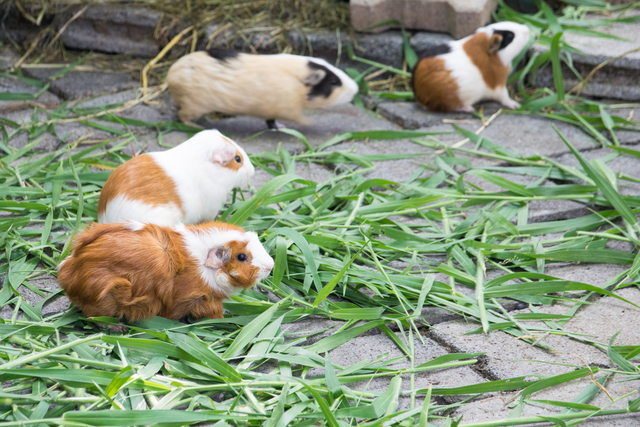How Much are Guinea Pigs? Understanding the Cost
Hello fellow guinea pig enthusiasts! If you’re thinking about bringing one of these adorable creatures into your home, you might be wondering, “How much are guinea pigs?” and when all expenses are taken into account, how much do guinea pigs actually cost?” As a proud guinea pig owner and aficionado, I can tell you that the costs can vary. Let’s dive in, shall we?
Initial Cost of Guinea Pigs
If you’re on the cusp of joining the vast community of guinea pig lovers, one of your first questions might be about the initial costs. Let me guide you through the factors that can influence how much you’ll spend upfront.
1) Store-Bought vs. Breeder:
The location of your purchase can be a significant factor. In many regular pet stores, a guinea pig might set you back anywhere from $10 to $40. It’s often a tempting route because of convenience. However, when buying from specialized breeders who raise guinea pigs in better conditions and often with specific lineage details, you might find the cost rising. For unique or rarer breeds, the price can vary between $30 to even $100 or more.
2) Breed Variation:
Just like dogs or cats, certain guinea pig breeds might be pricier than others due to their appearance, rarity, or specific care needs. A silkie, for instance, might be more expensive than an American Shorthair.
3) Age and Health:
Younger guinea pigs, especially those in good health and with recent vet checks, might be priced slightly higher than older ones. It’s essential to ensure that your chosen pet is healthy to avoid immediate additional vet costs.
4) Included Accessories:
Some sellers offer starter kits with the guinea pig, which can include a small cage, food, and bedding. These combo deals can sometimes be more cost-effective, but it’s crucial to ensure the quality of items provided.
5) Adoption:
Another heartwarming option is adoption. Many guinea pigs are waiting for their forever homes in shelters. Adoption fees can be between $10 to $35, and the best part? Many of these guinea pigs might already have initial health checks done, saving you that initial vet visit cost.
Essential Accessories Costs
Stepping into the world of guinea pig ownership, it quickly becomes evident that the pet’s purchase price is just the tip of the iceberg. The essential accessories, which ensure your little companion’s comfort, health, and happiness, are integral and require an initial investment.
Setting up a comfy home for our furry friends means investing in cages, bedding, food bowls, and water bottles. Expect to spend around $50 to $150 initially, depending on the quality and brand of these accessories.
Let’s break down these costs:
1) Cages and Enclosures:
Basic Cage: A starter cage can range from $30 to $50. But remember, guinea pigs need space to move around, so you might outgrow a starter cage as your pet grows or if you get more guinea pigs.
Mid-Range Cage: Designed for the comfort of the guinea pig, these cages offer more space and can range between $50 to $150.
Deluxe Enclosures: If you’re looking for something spacious with compartments, expect prices from $150 to $300 or more. These are especially recommended for multiple guinea pigs.
2) Bedding:
Paper-Based Bedding: A bag can cost anywhere from $10 to $30, depending on size.
Wood Shavings: These can range from $5 to $20 per bag. Avoid cedar shavings as they can be harmful; opt for aspen or pine.
3) Feeding Equipment:
Food Bowls: Ceramic or heavy plastic bowls are preferable to prevent tipping. These can be around $5 to $15 each.
Water Bottles: Essential for clean water supply, they can cost $5 to $20 based on size and design.
4) Toys and Enrichment:
Chew Toys: From $3 to $10.
Tunnels and Hideouts: Around $10 to $30, depending on material and complexity.
Exercise Wheels and Balls: Prices can vary between $10 to $50. Ensure they’re size-appropriate.
5) Grooming Supplies:
Brushes and Combs: Especially if you have long-haired breeds, they can range from $5 to $15.
Nail Clippers: Guinea-specific nail clippers can cost around $5 to $15.
6) Food Storage:
Containers: Air-tight containers to keep food fresh can cost between $10 to $30.
7) Travel Carrier: If you plan on traveling or need transportation to the vet, a carrier can range from $20 to $50.
Monthly Maintenance Costs
After the initial setup for your guinea pig, there are ongoing monthly expenses to ensure that they remain healthy, happy, and active. Here’s a breakdown of these costs, providing you with a clearer understanding of the commitment:
1) Food:
Pellets: Quality guinea pig pellets are crucial for their daily diet. A month’s supply can range from $10 to $30, depending on the brand and ingredients.
Hay: This is a staple in a guinea pig’s diet. Timothy hay, for instance, can cost between $20 to $40 per month.
Fresh Vegetables: Offering a variety of veggies can total around $15 to $35 monthly, depending on where you live and seasonal availability. Guinea Pigs also enjoy fruits occasionally as snacks, such as apples or grapes.
2) Bedding:
Replacing the bedding is necessary to keep the cage clean and odor-free. Depending on the type of bedding (paper-based or wood shavings) and the size of the cage, this can range from $15 to $40 per month.
3) Toys and Treats:
Chew Toys: To keep their teeth in check, guinea pigs need things to chew on. Though some toys last longer than a month, budget around $5 to $15 monthly for replacements or new additions.
Treats: Special treats can cost around $5 to $20 monthly.
4) Healthcare:
Vitamin C Supplements: Guinea pigs cannot produce vitamin C naturally, so supplements or vitamin-rich foods are essential. Supplements can cost around $5 to $15 per month.
Routine Vet Visits: Although not strictly a monthly cost, setting aside $5 to $10 monthly ensures you’re prepared for yearly check-ups and any unplanned visits.
5) Cleaning Supplies:
Disinfectant: Cleaning sprays safe for pets can cost about $5 to $15 monthly.
Paper Towels, Sponges, etc.: Budget around $5 to $10 monthly for these general cleaning supplies.
6) Miscellaneous:
Depending on the month, you might find yourself buying replacement items such as water bottles, bowls, or even cage components. Setting aside $5 to $20 monthly can help prepare for these unpredictable costs.
In total, the monthly maintenance for a guinea pig can range from roughly $85 to $235, depending on various factors, including where you live, the quality of products you purchase, and your guinea pig’s specific needs. While they’re not the most expensive pets to maintain, it’s essential to remember that cutting corners on their care can lead to higher costs down the road, both financially and in terms of their health and happiness.
The Hidden Costs
When considering the financial commitment of owning a guinea pig, some costs might not be immediately apparent. These “hidden” expenses can surprise many first-time guinea pig owners. It’s essential to be aware of them so that you’re fully prepared for the delightful journey of guinea pig parenthood:
1) Emergency Vet Visits:
Just like any other pet, guinea pigs can face unexpected health issues. A sudden illness or injury might require a visit to the vet, costing anywhere from $50 to $300 or more depending on the ailment and treatment.
2) Specialized Care:
If your guinea pig develops specific dietary needs or requires particular medications, these specialized items come with added costs, ranging from $10 to $100 monthly.
3) Travel and Boarding:
If you’re away for a trip, you might need to board your guinea pig or hire a pet sitter. These services can add up, costing around $10 to $30 per day.
4) Upgrades:
As you learn more about your pet’s preferences or as they grow, you might decide to upgrade their habitat or toys. Such improvements can range from $20 to $150.
5) Training and Books:
Books or resources about guinea pig care, behavior, and training can cost between $10 to $30. While not a recurring expense, it’s an initial cost many overlook.
6) Loss of Items:
Sometimes, guinea pigs can be a bit mischievous and might chew on things they shouldn’t, like wires, curtains, or other household items. The replacement of such items can add unexpected costs.
7) Adoption or Breeder Fees:
If you’re acquiring a guinea pig from a rescue organization or a reputable breeder, there might be an associated fee. While this is a one-time cost, it can range from $10 to $50 or even more, especially for specific breeds.
8) Additional Guinea Pigs:
Guinea pigs are social animals, and many experts recommend having more than one to keep them company. This means doubling up on many of the initial and monthly expenses.
9) Long-term Commitment:
Guinea pigs have a lifespan of 4-8 years, sometimes even longer. This longevity means that the financial commitment isn’t just short-term. Over the years, costs can accumulate, especially when considering healthcare as they age.
Cost-cutting Tips without Compromising Quality
Guinea pig ownership, while incredibly rewarding, can indeed come with its share of expenses. However, there are ways to minimize costs without skimping on the quality of care for your furry friend. Here’s how you can save money and still ensure your guinea pig lives a happy, healthy life:
1) DIY Toys and Shelters:
Instead of buying pricey toys or hides, use cardboard boxes, paper towel tubes, or even old socks to create fun toys and shelters. Just ensure they’re safe, free from harmful dyes, and devoid of small parts that could be ingested.
2) Buy in Bulk:
Purchasing food, hay, or bedding in larger quantities often results in a lower cost per unit. Just ensure you store perishables properly to maintain freshness.
3) Regular Health Check-ups:
While it may seem counterintuitive, regular health check-ups can help detect potential issues before they become severe (and expensive). Prevention is always cheaper than cure!
4) Group Discounts:
Some vets or pet supply stores offer discounts if you buy products or services for multiple pets. If you have more than one guinea pig or other pets, this can lead to significant savings.
5) Adopt, Don’t Shop:
Adopting a guinea pig from a rescue or shelter is often cheaper than buying from a pet store or breeder. Plus, you’re giving a home to a guinea pig in need!
6) Grow Your Own Veggies:
Plant a small vegetable garden in your backyard or even in pots. This way, you can offer fresh, organic treats to your guinea pig at a fraction of the cost.
7) Compare Prices:
Before making purchases, compare prices from various sellers, both online and offline. Sometimes, online stores or local farmer’s markets might offer better deals.
8) DIY Bedding:
Instead of buying commercial bedding, you can use shredded newspaper or even fleece. Fleece liners can be washed and reused, saving money in the long run.
9) Join Guinea Pig Forums or Groups:
Engaging in communities dedicated to guinea pig care can offer a wealth of knowledge, including tips on cost-effective care, deals, or sales.
10) Opt for Multi-use Products:
Some products can serve multiple purposes. For instance, a spacious cage can eliminate the need for a separate playpen.
11) Watch for Sales and Discounts:
Keep an eye out for sales, especially during holidays or end-of-season periods. This can be a good time to stock up on essentials.
12) Reuse and Repurpose:
Before tossing something out, think about how it might be used for your guinea pig. An old T-shirt, for instance, can be turned into a cozy hammock.
By incorporating these cost-saving measures, you can efficiently manage your budget while still ensuring your guinea pig receives top-notch care. Remember, a happy guinea pig doesn’t need expensive items; they need a loving, attentive owner who meets their essential needs.
Long-term Commitments
Guinea pigs live an average of 5-8 years. Over a lifetime, the costs multiply. So, it’s essential to think of them as a long-term financial commitment.
Adoption vs. Purchasing: A Price Comparison
Adopting can be a win-win. You provide a loving home for a guinea pig in need and often spend less, as adoption fees range from $10 to $35. Plus, they often come with initial vet checks!
The Value of Premium Breeds
If you’re eyeing a specific breed, know that premium breeds can have a heftier price tag due to their uniqueness and demand.
Importance of Budgeting
A budget isn’t just for our bills and groceries. Setting aside a monthly amount for our pets ensures they’re well taken care of without straining our wallets.
Investments in Health: Unexpected Medical Expenses
Guinea pigs, like us, can have unexpected health issues.
- Regular Vet Check-ups: A regular visit might cost $45-$60.
- Emergency Situations: This can be pricier, with costs varying based on the situation, such as a Guinea Pig entering torpor which is mistaken for hibernation.
The True Value Beyond Money
Finally, while there’s a cost to owning a guinea pig, the joy, companionship, and sheer entertainment they bring? Priceless!
How Much are Guinea Pigs Conclusion
Being prepared financially for a guinea pig is part of being a responsible owner. While they do have associated costs, the happiness they bring to our lives is worth every penny!
How Much are Guinea Pigs FAQs
How often should I budget for unexpected health issues?
While it’s hard to predict, setting aside $5-$10 a month can help in long-term unforeseen situations.
Are certain breeds more expensive to care for?
Some breeds might have specific needs, but the general care costs remain similar across breeds.
Do guinea pigs need regular vet visits?
Yes, annual or bi-annual check-ups are ideal.
Can I save money by making DIY toys?
Absolutely! Guinea pigs often love simple toys made from safe household items.
Is it cheaper to own more than one guinea pig?
While there are benefits to companionship for your pets, the costs essentially double with two guinea pigs.




